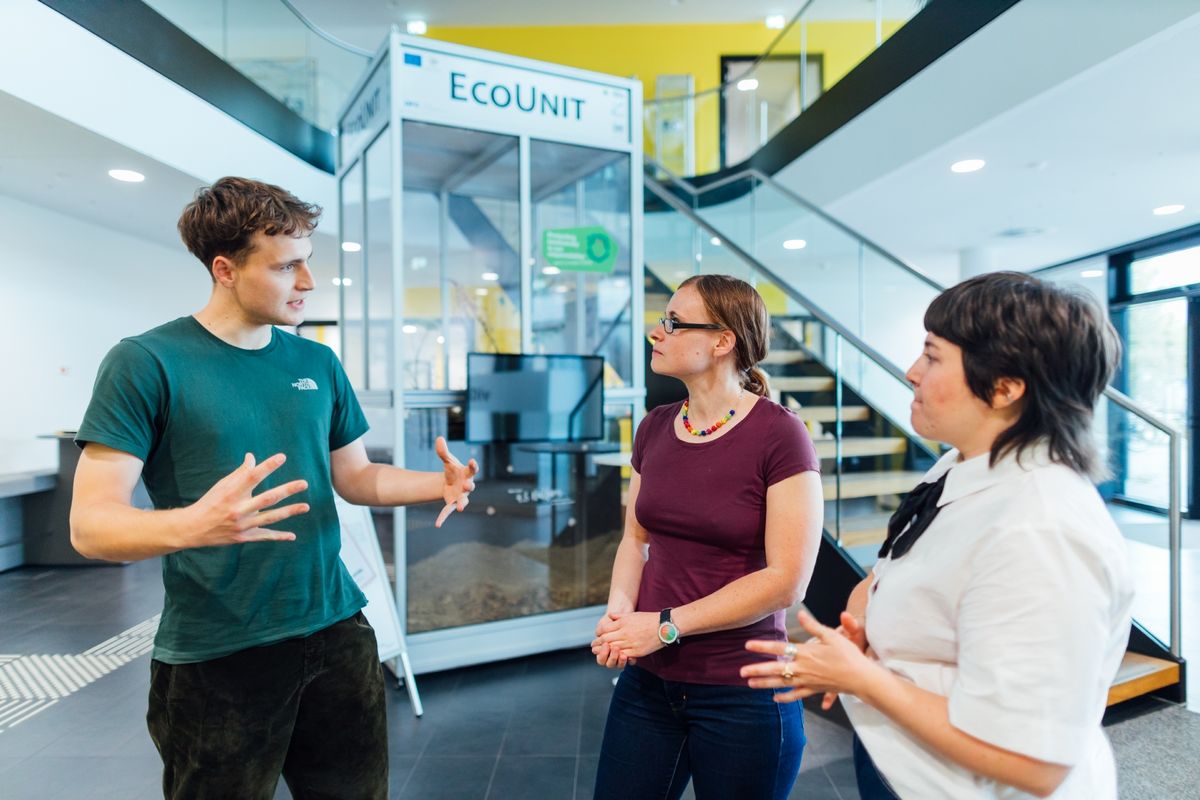Research Training Group (RTGs) are thematic research programmes that serve the structured qualification of junior researchers. By integrating courses, the focus is on providing participants with further training. They prepare doctoral candidates for their everyday academic work and help them become independent.
Research Training Group Hosted by Leipzig University:
The RTG 2939 “Economics of Connected Natural Commons: Atmosphere and Biodiversity - Eco-N” develops an integrative perspective on the sustainable use of natural commons in the area of the atmosphere - namely aerosols, regional climate and urban air - and biodiversity - namely forests and soils. Martin Quaas, Faculty of Economics and German Center for Integrative Biodiversity Research (iDiv), is the spokesperson for the RTG, which will begin its research work in fall 2024.
The IRTG 2899 “Belongings: Jewish Material Culture in Twentieth-Century Europe and Beyond” is an international research training group in cooperation with the Hebrew University in Israel and the Leibniz Institute for Jewish History and Cultures - Simon-Dubnow that investigates Jewish objects, materials, history and culture in an interdisciplinary research approach. The IRTG, with Professor Yfaat Weiss, Faculty of History, Arts and Area Studies and Director of the DI, as spokesperson and Professor Benjamin Pollock, Hebrew University, as co-spokesperson, will begin its research work in fall 2024.
Hydrogen Isotopes 1,2,3H
In Research Training Group 2721, Hydrogen Isotopes 1,2,3H, chemists and physicists from different disciplines conduct research in three overlapping research areas on (A) chemical bonds, (B) membranes and diffusion, and (C) labelling and detection of hydrogen isotopes. The goals of the 15 research projects are to understand nuclear quantum effects, to synthesise new materials for the separation of hydrogen isotopes, and to develop methods for late-stage hydrogen isotope exchange. The spokesperson of the Research Training Group is Professor Knut Asmis from the Wilhelm Ostwald Institute of Physical and Theoretical Chemistry.
Research Training Groups (Leipzig University as Applicant):
The International Research Training Group “TreeDi – Tree Diversity Interactions: The Role of Tree-Tree Interactions in Local Neighbourhoods in Chinese Subtropical Forests” led by the German Centre for Integrative Biodiversity Research (iDiv) Halle-Jena-Leipzig together with the University of Chinese Academy of Sciences (UCAS) in China is investigating how tree-tree interactions in local neighbourhoods translate into the observed positive tree species richness effects on key ecosystem functions at the community level. The international qualification programme provides for intensive Chinese-German cultural exchange during a six-month research stay in the partner country. There is also a joint doctoral candidate advisory committee with Chinese and German project leaders and close cooperation with leading figures of biodiversity research.
The aim of Research Training Group 2522, “Strong Dynamics and Criticality in Quantum and Gravitational Systems”, is to investigate and calculate the emergence of complexity in gravitational and quantum field theories based on basic building blocks. The teams focus on examples of topicality or conceptual relevance, such as gravitational wave phenomena and black holes on the gravitational side and dynamics and criticality of near phase transitions on the quantum side. The Research Training Group is conducted in collaboration with the Friedrich Schiller University Jena.
Research Training Group (Leipzig University as Project Partner):
The Graduate School 2767 "Supramolecular Structures: From Materials to Optical and Electronic Components" at the Dresden University of Technology, led by Professor Andreas Fery, connects the research areas of applied physics and device development. All doctoral projects are located at the interface between materials and components and address generic challenges that enable the transition from materials to components.
Professor Ralf Seidel from the Peter Debye Institute for Soft Matter Physics is one of the project leaders of the graduate school in the field of physics.
Integrated Research Training Groups in Collaborative Research Centres and Research Centres:
The Obesity Mechanisms Integrated Research Training Group is part of the Collaborative Research Centre of the same name, CRC 1052.
Collaborative Research Centre 1199, Processes of Spatialization Under the Global Condition, offers an Integrated Research Training Group.
The Graduate School yDiv is part of the German Centre for Integrative Biodiversity Research (iDiv).
The Integrated Research Training Group is part of Collaborative Research Centre 1423, Structural Dynamics of GPCR Activation and Signaling. Its training programme covers all aspects of current GPCR research. A comprehensive qualification programme is being established, comprising four sections: scientific modules, annual summer schools, international laboratory rotations, and professional skills workshops. This profile qualifies graduates for independent careers in a variety of academic and industrial fields.
The integrated graduate program is part of Transregio 386 "HYP*MOL - Hyperpolarization in Molecular Systems." The training program will provide PhD students and postdoctoral researchers of the TRR with a solid scientific background in the core areas of the collaborative project: hyperpolarized methods of magnetic resonance, molecular spintronics, and spin chemistry. The research brings together young researchers from these three fields and, for the first time, trains a generation of spin scientists who are proficient in all three areas. The training program includes specialized scientific modules on the current state of hyperpolarization research, joint summer schools, international lab rotations, and workshops for professional qualification at UL and TU Chemnitz.






























































